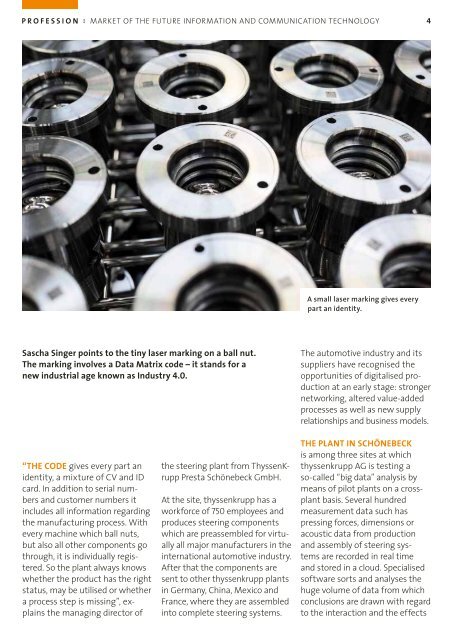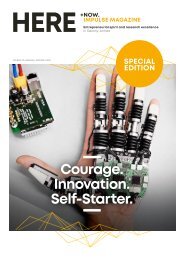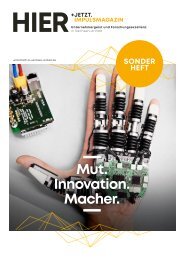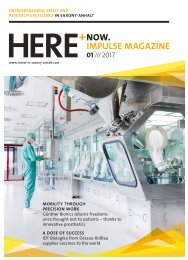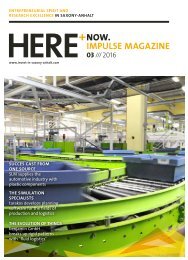HERE+NOW.IMPULSE MAGAZINE /// 01/2016
HERE IT CREATES FUTURE. Over the years to come, digitalisation will make big changes to our lives. Whether it is industry, handicrafts or the service sector, all will have to adapt to it at high speed. The opportunities provided by digitalisation are just as great as the pressure to create innovations. For this reason, information and communications technologies have been defined as an important market of the future in the Saxony-Anhalt Regional Innovation Strategy 2014 – 2020. But it isn’t just the world of business which is facing a digital transformation, the world of public administration is as well. For companies and citizens that means user friendliness – in terms of ease of access, transparent processes as well as flexibility due to time and location independent administrative services. Increasing digitalisation requires more digital education. In recent years, the development of the internet has been so rapid that the requirements in the population have become very different. From primary school pupils to senior citizens, the levels of understanding surrounding technology need to grow, in addition to the ability to apply the knowledge in a correct and beneficial way. For innovations and applications in the digital sphere, the users’ confidence in IT security and data protection are basic requirements. In this respect, the digitalisation of our daily lives will only gain widespread acceptance if IT security keeps in pace with the wider developments. Saxony-Anhalt is well equipped for the digital age. The federal state is already home to many IT companies which have made the conscious decision to locate here and value the excellent local infrastructure. This not only includes sector giants such as T-Systems and SAP, but also cutting-edge start-ups such as UCD+ and marmalade.
HERE IT CREATES FUTURE.
Over the years to come, digitalisation will make big changes to our lives. Whether it is industry, handicrafts or the service sector, all will have to adapt to it at high speed. The opportunities provided by digitalisation are just as great as the pressure to create innovations. For this reason, information and communications technologies have been defined as an important market of the future in the Saxony-Anhalt Regional Innovation Strategy 2014 – 2020.
But it isn’t just the world of business which is facing a digital transformation, the world of public administration is as well. For companies and citizens that means user friendliness – in terms of ease of access, transparent processes as well as flexibility due to time and location independent administrative services.
Increasing digitalisation requires more digital education. In recent years, the development of the internet has been so rapid that the requirements in the population have become very different. From primary school pupils to senior citizens, the levels of understanding surrounding technology need to grow, in addition to the ability to apply the knowledge in a correct and beneficial way.
For innovations and applications in the digital sphere, the users’ confidence in IT security and data protection are basic requirements. In this respect, the digitalisation of our daily lives will only gain widespread acceptance if IT security keeps in pace with the wider developments.
Saxony-Anhalt is well equipped for the digital age. The federal state is already home to many IT companies which have made the conscious decision to locate here and value the excellent local infrastructure. This not only includes sector giants such as T-Systems and SAP, but also cutting-edge start-ups such as UCD+ and marmalade.
Create successful ePaper yourself
Turn your PDF publications into a flip-book with our unique Google optimized e-Paper software.
PROFESSION : MARKET OF THE FUTURE INFORMATION AND COMMUNICATION TECHNOLOGY<br />
4 5 PROFESSION<br />
A small laser marking gives every<br />
part an identity.<br />
Everything in view:<br />
managing director Sascha Singer.<br />
Sascha Singer points to the tiny laser marking on a ball nut.<br />
The marking involves a Data Matrix code – it stands for a<br />
new industrial age known as Industry 4.0.<br />
“THE CODE gives every part an<br />
identity, a mixture of CV and ID<br />
card. In addition to serial numbers<br />
and customer numbers it<br />
includes all information regarding<br />
the manufacturing process. With<br />
every machine which ball nuts,<br />
but also all other components go<br />
through, it is individually registered.<br />
So the plant always knows<br />
whether the product has the right<br />
status, may be utilised or whether<br />
a process step is missing”, explains<br />
the managing director of<br />
the steering plant from ThyssenKrupp<br />
Presta Schönebeck GmbH.<br />
At the site, thyssenkrupp has a<br />
workforce of 750 employees and<br />
produces steering components<br />
which are preassembled for virtually<br />
all major manufacturers in the<br />
international automotive industry.<br />
After that the components are<br />
sent to other thyssenkrupp plants<br />
in Germany, China, Mexico and<br />
France, where they are assembled<br />
into complete steering systems.<br />
The automotive industry and its<br />
suppliers have recognised the<br />
opportunities of digitalised production<br />
at an early stage: stronger<br />
networking, altered value-added<br />
processes as well as new supply<br />
relationships and business models.<br />
THE PLANT IN SCHÖNEBECK<br />
is among three sites at which<br />
thyssenkrupp AG is testing a<br />
so-called “big data” analysis by<br />
means of pilot plants on a crossplant<br />
basis. Several hundred<br />
measurement data such has<br />
pressing forces, dimensions or<br />
acoustic data from production<br />
and assembly of steering systems<br />
are recorded in real time<br />
and stored in a cloud. Specialised<br />
software sorts and analyses the<br />
huge volume of data from which<br />
conclusions are drawn with regard<br />
to the interaction and the effects<br />
of various process steps. “As a result,<br />
our production is much more<br />
efficient and flexible. Moreover,<br />
errors can be immediately detected<br />
and corrected. The likelihood<br />
that defective products leave the<br />
plant is virtually zero”, says managing<br />
director Singer with a sense<br />
of pride. The 36-year-old worked<br />
eight years for thyssenkrupp AG in<br />
Shanghai, before he took over the<br />
operations in Schönebeck in 2<strong>01</strong>4.<br />
THE INDUSTRIAL ENGINEER<br />
VIEWS predictions that digitalisation<br />
will destroy jobs on a<br />
grand scale with scepticism. “I am<br />
more confident here. There will<br />
undoubtedly be shifts among the<br />
fields of work. In some areas jobs<br />
will disappear, whereas entirely<br />
new jobs will emerge in other areas.<br />
In 1984, on the day of the first<br />
e-mail in Germany, who would<br />
have anticipated that 300,000<br />
people would be working in the<br />
German digital economy today?<br />
We should endeavour towards a<br />
more sober view regarding the<br />
subject of digitalisation”, says the<br />
native-born Austrian Sascha Singer.<br />
“Wherever data will be compiled<br />
on a large-scale basis, the<br />
subject of IT security will logically<br />
play a pivotal role. New jobs will<br />
definitely emerge in this field.”<br />
It is certain that higher demands<br />
on the qualification of employees<br />
will be imposed in the course of<br />
digitalisation. That is why a solid<br />
promotion of young talent is<br />
indispensable. A new apprenticeship<br />
workshop, in which about 36<br />
young people will be trained every<br />
year, was first put into operation<br />
at the plant in Schönebeck in the<br />
summer of 2<strong>01</strong>5. ThyssenKrupp<br />
Presta Schönebeck GmbH is also<br />
working together on a project-related<br />
basis with students and<br />
professors from Otto-von-Guericke<br />
University Magdeburg.<br />
THE PILOT PLANT in Schönebeck<br />
is only one of many steps towards<br />
digitalisation for thyssenkrupp<br />
AG. The corporate group is currently<br />
pointing the way ahead for<br />
a comprehensive digitalisation<br />
of all production processes. The<br />
backbone for this is a harmonised<br />
and highly efficient IT infrastructure<br />
with separate data processing<br />
centres. Collecting, storing<br />
and processing large volumes of<br />
data in all value-added steps are<br />
inconceivable without standardised<br />
systems.<br />
“THE INDUSTRY is in the early<br />
sta ges of a radical change. Compa-


